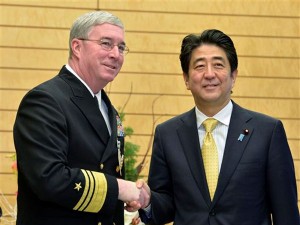
Vice Admiral John W. Miller, commander of US Naval Forces Central Command and 5th Fleet, shakes hands with Japanese Prime Minister Shinzo Abe, right, prior to their talks at Abe’s official residence in Tokyo Thursday, December 19, 2013. AP Photo/Yoshikazu Tsuno
TOKYO – Japanese Prime Minister Shinzo Abe looks set to win approval from Okinawa this week for the long-stalled relocation of a US military base after a meeting Wednesday with the island’s pugnacious governor.
A deal with Okinawa would end a long-running dispute that has been a source of friction with Washington and also mark a significant achievement for Abe, who has sought closer US ties amid a simmering territorial row with China.
Abe pledged an unheralded cash bonanza for the archipelago, in the form of stimulus spending that commentators say could help persuade governor Hirokazu Nakaima to drop his longstanding opposition to construction of a new airbase.
“You presented surprisingly impressive proposals. I express my heartfelt appreciation as the representative of Okinawa’s 1.4 million people,” the governor told Abe.
Abe told Nakaima he would set aside at least 300 billion yen ($2.9 billion) for Okinawa’s economic stimulus budget every year until fiscal 2021.
The package of proposals also includes halting the operations of the Futenma airbase within five years and the early return of the land.
The local politician said he would make a formal decision by Friday on whether to approve the government’s plan to relocate the airbase on the coast.
“I think we will have a good New Year’s Day,” he told reporters, looking set to give it his blessing.
Abe also told the governor: “The government will do anything possible.”
The premier also said Tokyo and Washington had reached agreement on negotiating an environmental stewardship framework which would supplement the Status of Forces Agreement (SOFA).
“This framework will help guide our activities going forward related to our shared goal of reducing impact to Japan’s precious natural landscape as we continue to conduct operations that provide for the common defense of Japan,” said US Defense Secretary Chuck Hagel.
“This is yet another step we are taking together in order to update and modernize our alliance to ensure it is able to meet the security challenges of the 21st century,” he said in a statement.
Nakaima’s approval would mark a breakthrough in Japan-US efforts to follow through on an original 1996 agreement to shut the Futenma airbase, which is in a densely-populated urban area.
The United States reaffirmed in 2006 it would re-site the base on the coast, but the move has been stymied by opposition throughout Okinawa, which feels overburdened by its outsized share of the American military presence in Japan.
“Reducing the burden (of the US military presence) on Okinawa is one of the most significant challenges for the government, while it is extremely important for the US-Japan alliance,” said Chief Cabinet Secretary Yoshihide Suga.
Campaigners criticize the choice of the planned new site, in Nago, saying it is home to a rare sea mammal called the dugong and the landfill required would badly affect its habitat.
With around half of the 47,000 US service personnel in Japan based in Okinawa, the strategically-situated island chain is a crucial part of the US-Japan security alliance, despite local hostility to the military presence.
Japan has sought to enhance military cooperation with the US amid simmering tensions with Beijing over the sovereignty of a group of islands in the East China Sea.

